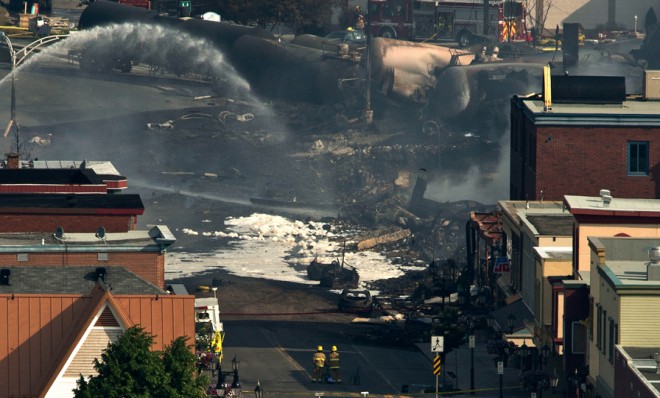Could more oil pipelines have prevented the explosion in Quebec?
Proponents of Keystone XL seem to think so

This week, 73 oil tankers jumped the tracks near Lac-Mégantic, Quebec, and slammed into the town's public square, exploding into a searing ball of fire that destroyed 30 buildings, killed at least 13 people, and left 50 others missing.
It was the most destructive and high-profile incident in a recent series of North American oil shipping accidents that have awakened another round of squabbling over whether the Obama administration should approve construction of the Canada-to-Nebraska leg of the Keystone XL Pipeline, a 2,000-mile conduit that will connect Alberta's oil sands with the world's largest oil refining market on the American Gulf Coast.
Proponents of Keystone say the incident is just more evidence that transporting oil by rail is more dangerous than using pipelines. The research shows they may have a point: A 2012 study by the Manhattan Institute found that between 2005 and 2009, spills involving hazardous materials were 33 times more likely with rails than pipelines, reports Bloomberg. However, the Association of American Railroads calls the report "seriously flawed."
The Week
Escape your echo chamber. Get the facts behind the news, plus analysis from multiple perspectives.

Sign up for The Week's Free Newsletters
From our morning news briefing to a weekly Good News Newsletter, get the best of The Week delivered directly to your inbox.
From our morning news briefing to a weekly Good News Newsletter, get the best of The Week delivered directly to your inbox.
Not accounted for in the Manhattan study is the different requirements for rail and pipelines in reporting spills, said [Holly] Arthur, the railroad association spokeswoman. While pipelines don’t have to report any spill under 5 gallons, trains must. The study also undercounts the volume of other hazardous materials hauled by rail, inflating the spill rate. [Bloomberg]
With adjustments, the railroad association argues, railroads account for just 2.7 times more spills than pipelines.
But pro-Keystone stumpers like The Globe and Mail's Diana Furchtgott-Roth say that "human safety should be a paramount consideration" Furchtgott-Rothargues argues, "If this oil shipment had been carried through pipelines, instead of rail, families in Lac-Mégantic would not be grieving for lost loved ones today, and oil would not be polluting Lac-Mégantic and the Chaudière River."
"Chalk up another green policy fail," says Walter Russell Meade in The American Interest. He continues:
Blocking the pipeline won’t stop the oil from coming out of the ground, and it won’t make it impossible to transport it across American soil. What it will do, however, is make it more costly to accomplish these things, as well as causing greater environmental harm in the process. It’s painfully clear no one really thought through this crusade before committing to it. [The American Interest]
Keystone's opponents say that pumping oil sands petroleum and diluted bitumen — both of which will pass through Keystone — will corrode pipes, eventually causing bigger accidents. In March, a pipe burst and thousands of barrels of Canadian crude gushed into a suburban neighborhood in Mayflower, Ark. That incident involved diluted bitumen.
A free daily email with the biggest news stories of the day – and the best features from TheWeek.com
They also argue that the Keystone decision is about more than transportation safety. The Wall Street Journal:
Environmental groups and other Keystone opponents say the accident will not weaken their hand. Although concerned about safety, they mostly oppose Keystone on the grounds that it provides an outlet for Canada’s oil sands production, which releases more greenhouse gas emissions than conventional crude. Many say they would fight just as hard against a proposed rail project to ship Canadian oil sands. [Wall Street Journal]
But for some, the question boils down to which is the lesser of two evils. Forbes' Tim Worstall:
So, if we assume that oil is indeed going to be drilled, pumped, shipped to refineries and then used, we want the system to do so which kills the least possible number of people in the process. Other things are also important, the environment and so on but our first duty is of course to people. At which point I think the decision moves firmly in the direction of pipelines. [Forbes]
Carmel Lobello is the business editor at TheWeek.com. Previously, she was an editor at DeathandTaxesMag.com.
-
 5 chilling cartoons about increasing ICE aggression
5 chilling cartoons about increasing ICE aggressionCartoons Artists take on respect for the law, the Fourth Amendment, and more
-
 Political cartoons for January 24
Political cartoons for January 24Cartoons Saturday's political cartoons include 3D chess, political distractions, and more
-
 Ryanair/SpaceX: could Musk really buy the airline?
Ryanair/SpaceX: could Musk really buy the airline?Talking Point Irish budget carrier has become embroiled in unlikely feud with the world’s wealthiest man